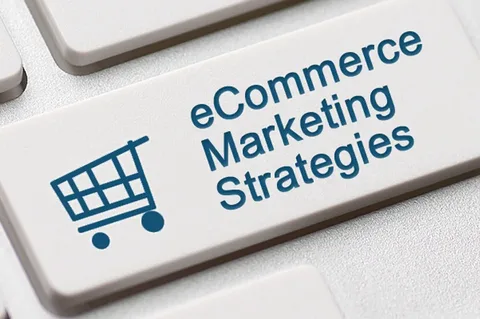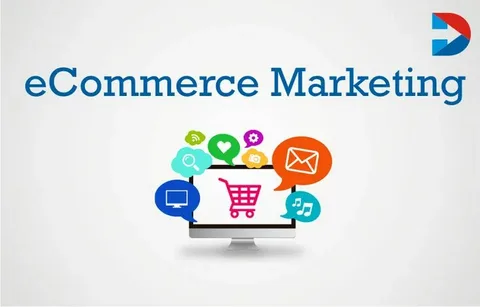What is E-commerce Marketing?

E-commerce marketing encompasses all strategies and activities one undertakes to drive traffic to, engage with potential customers, and turn them into paying customers on an e-commerce platform. It’s crucial in the success of any given e-business. In the digitized era of today, when most aspects of commerce are happening online, businesses reach out for electronic marketing to get a wide customer base and boost their sales volume.
E-commerce marketing is very much important in the development and success of an online business. Since more and more people are into online shopping, companies should also continuously adapt to effective e-commerce marketing strategies in order to reach their target audience and drive sales. This involves different techniques, from the use of social networking sites down to content marketing methods, in order to be successful in the competitive world of an online business. In this article, we are going to look at some e-commerce marketing strategies that will help raise the visibility of your business and bring in customers to increase your revenue.
How to Understand E-commerce Marketing
This is all the activities that may involve selling an online store and its products or services. Whether through social media, content marketing, email campaigns, or paid advertising, the whole idea remains the bringing of awareness to drive traffic and, ultimately, convert such traffic into sales. Unlike traditional retail, e-commerce marketing is purely digital; hence, it relies on online channels to consumers who are buying on e-commerce platforms.
E-commerce Marketing Strategies
Indeed, there are many means or ways of e-commerce marketing strategies that a business might make use of. The most vital among them would include:

- Search Engine Optimization:
SEO is one of the major drivers of organic traffic to your e-commerce website. Optimizing your product pages, blog posts, and category pages for relevant keywords like “e-commerce marketing,” “e-commerce platforms,” among others, enables your store to achieve higher positioning in the search engine result pages that attracts more visitors. - Content Marketing:
Content Marketing: Through Valuable, Relevant, and Consistent Content It helps in attracting and retaining the audience. Blogging, guides, and videos regarding your product or e-commerce platform will increase your brand’s visibility. Quality content builds trust and may influence customers to make a purchase. - Email Marketing:
It is still one of the effectual ways for lead nurturing and conversion into customers through email marketing. You can also re-engage your past customers or lure a new one by sending personalized product recommendations, exclusive offers, and timely updates. - Social Media Marketing:
Social media is a big channel to market your e-commerce business. With Facebook, Instagram, and Pinterest, you can showcase your products to engage with the audience and run targeted ads toward better conversion. More importantly, influencers and shareable content are leveraged in driving customers to an online store. - Paid Advertising:
Pay-per-click advertising is one of the best ways to get instant visibility for your e-commerce store. Google Ads, Facebook Ads, and other paid platforms help businesses showcase their products to targeted audiences based on demographics, interests, and online behaviors. - Affiliate Marketing:
One can use affiliate marketing to drive other bloggers, influencers, and businesses in promoting their products across their channels. Affiliates will drive traffic and sales to your e-commerce store through the promotion of products for some commission to help expand reach.
Benefits of E-commerce Marketing

There are a number of benefits to be accrued from e-commerce marketing to businesses:
- Wider Reach: Digital marketing strategies will help you reach out to people from any part of the world. This way, your customer base will not be bounded by geographical factors.
- Lower Costs: Many other e-commerce marketing strategies are quite affordable when compared to some traditional methods. These include SEO and content marketing.
- Measurable Outputs: Tools like Google Analytics bring all campaign successes into sight and thus enable decisions in light of data insights.
- Better Customer Relationship: Social media and email marketing will enable you to speak directly with your customers, thereby strengthening relationships and brand loyalty.
E-commerce Platforms and Their Role
The success of any e-commerce marketing depends on the type of e-commerce platform a marketer will choose. The e-commerce platforms like Shopify, WooCommerce, and BigCommerce offer various tools and features that help in running and managing the store, conducting various marketing campaigns, and tracking the performance of an online store. They are integrated with other social media and email marketing tools for better and easier execution and monitoring of e-commerce marketing strategies.
Impact of Social Media on E-Commerce
Presently, social media has become a factor of great importance for e-commerce marketing. The reason for this is simple: it gives the opportunity for community building, direct communication with customers, and product promotion to different target groups. Nowadays, even Instagram and Facebook allow their users to buy products through shopping features on social media platforms, thus making the buying process seamless.

The more user-generated content shared on the social media platforms, the higher the effect on boosting brand trust and conversion rates. By having a strong presence on social media, e-commerce marketing businesses are always assured to be connected with their audience. Hence, social proof has become a really good avenue by which sales are driven.
Conclusion
E-commerce marketing plays a very important role in online sales and extension of reach. Proper e-commerce marketing strategies will duly enable your business to reach your targeted audience, build brand visibility, and improve customer engagement. From the use of social media down to the optimization of an e-commerce platform, there is personalization involved with customers to move them through the sales funnel at improved conversion rates.
Clarity on how to leverage the proper technique of content marketing, among other e-commerce strategies, is one key to growth in this competitive market. With the proper investment in e-commerce marketing tools, a business owner can take the lead in ensuring that these businesses meet their goals and have the edge they need online.
E-commerce marketing basically is the backbone of any online business. A well-rounded marketing strategy that contemplate SEO, content marketing, social media, and email marketing definitely helps your business be at the top in this competitive digital marketplace. One can efficiently manage the store by leveraging the right e-commerce platforms and tools, captivating customers, and growing online presence Next Blog Post
FAQ
1. What is e-commerce marketing?
E-commerce marketing refers to the strategies used to drive traffic and sales for an online business through various digital channels like social media, content marketing, SEO, and email marketing.
2. Why is e-commerce marketing important?
E-commerce marketing helps businesses reach a wider audience, increase brand visibility, and boost sales by leveraging digital platforms and marketing tactics.
3. What are some effective e-commerce marketing strategies?
Popular e-commerce marketing strategies include search engine optimization (SEO), content marketing, social media marketing, email marketing, and paid advertising.
4. How does social media impact e-commerce marketing?
Social media allows e-commerce businesses to engage with customers, promote products, and drive traffic to their websites. It also offers shopping features that simplify the purchase process.
5. Which e-commerce platforms are best for marketing?
Platforms like Shopify, WooCommerce, and BigCommerce are popular for their marketing tools, integrations with social media, and features that support effective e-commerce marketing campaigns.




